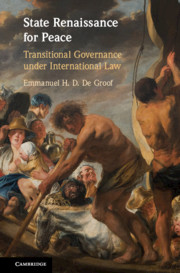Book contents
- Reviews
- State Renaissance for Peace
- State Renaissance for Peace
- Copyright page
- Dedication
- Contents
- Tables
- Foreword
- Preface
- Acknowledgements
- Additional material
- Abbreviations
- Introduction Transitional Governance Today
- Part I The Unchartered Territory of Transitional Governance
- Part II Foundation and Actors of Transitional Governance * Sources of Ius in Interregno
- Part III Self-Determination through Transitional Governance
- Part IV Moderating External Influence on Transitional Governance
- 8 Limits to External Involvement with Transitional Governance
- 9 The Inducement of Oppositional Transitional Governance
- 10 Indirect Regime Change
- General Conclusion
- Index
8 - Limits to External Involvement with Transitional Governance
from Part IV - Moderating External Influence on Transitional Governance
Published online by Cambridge University Press: 10 September 2020
- Reviews
- State Renaissance for Peace
- State Renaissance for Peace
- Copyright page
- Dedication
- Contents
- Tables
- Foreword
- Preface
- Acknowledgements
- Additional material
- Abbreviations
- Introduction Transitional Governance Today
- Part I The Unchartered Territory of Transitional Governance
- Part II Foundation and Actors of Transitional Governance * Sources of Ius in Interregno
- Part III Self-Determination through Transitional Governance
- Part IV Moderating External Influence on Transitional Governance
- 8 Limits to External Involvement with Transitional Governance
- 9 The Inducement of Oppositional Transitional Governance
- 10 Indirect Regime Change
- General Conclusion
- Index
Summary
The internationalisation of TG is now a fact. What are external actors, when providing assistance to TG, legally prevented from doing? They must in any event respect, and refrain from obstructing, the obligations incumbent on TA. They must avoid any misalignment with the minimum common denominator of emerging customary rules in relation to TG. This translates into concrete prohibitions for external actors who are prevented from imposing TG; altering the limitations ratione temporis and ratione materiae to the interim rule; undermining inclusivity; and impeding domestic TJ efforts. More generally, they have an obligation of moderation and must respect the fiduciary nature of TG serving a specific goal: the progressive and inclusive realisation of self-determination. The level of intensity of these norms and prohibitions (and potential engagement of their international responsibility) depends on the legal force of the core obligations from which they are derived or on the extent to which said principle has effectively gained precision through them.
Keywords
- Type
- Chapter
- Information
- State Renaissance for PeaceTransitional Governance under International Law, pp. 283 - 314Publisher: Cambridge University PressPrint publication year: 2020

